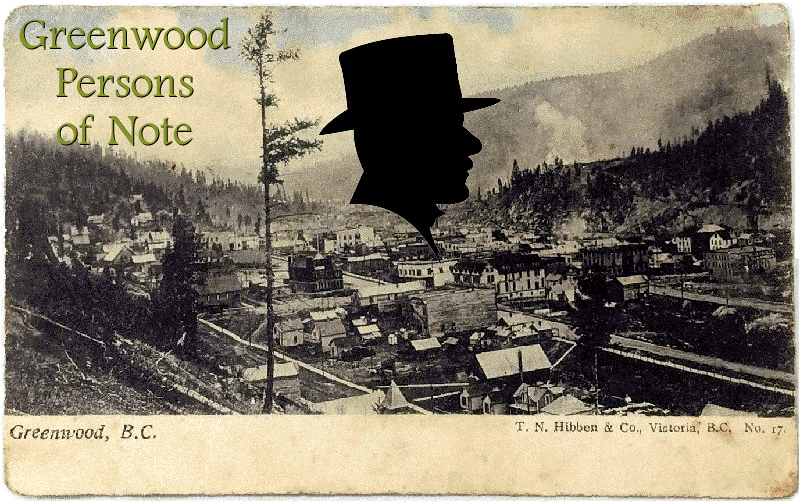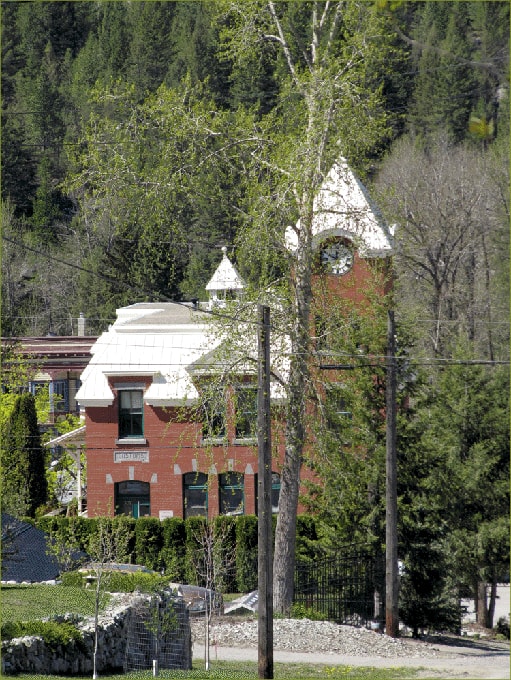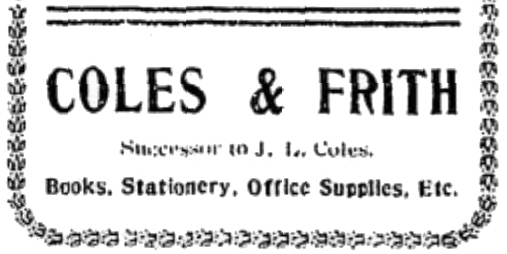
Greenwood, British Columbia, c. 1905
BY: BG EDITOR
Dec 31, 2016 — GREENWOOD, BC (BG)
Today we present another of Greenwood's early personalities of note — Kenneth C. B. Frith, whose biographical sketch is included in the book, A History of British Columbia by R. Edward Gosnell:[1]
KENNETH C. B. FRITH
"Kenneth C. B. Frith, filling the position of Postmaster of Greenwood, was born in St. John, New- Brunswick, April 2, 1868, his father being H. W. Frith, now deceased. He was a public school student in his native city and after putting aside his text books was engaged in the insurance business for a short time. Later he went to Florida, where he was connected with the orange trade for four years, when the "big freeze" of 1890 ruined his trees and he returned to St. John.
He then entered the hardware business, in which field of commercial activity he remained for ten years and in 1898 he came to Greenwood, where he has since lived. Entering the employ of Postmaster King he remained with him for six months and upon his resignation Mr. Frith was appointed to fill the office in January, 1900, and has since acted in that capacity.
He is a member of the Greenwood Lodge No. 29, K. P."
Kenneth's father, H. W. Frith of Saint John, New Brunswick, served as Clerk of the Peace of the City and County of Saint John, and also as the city's Secretary-Treasurer. He is mentioned in these roles in various reports, including a provincial statement dated 1876[2-3] about taxation and the New Brunswick penitentiary.
There were several Friths living in Greenwood at the time Kenneth C. B. Frith resided here. Among them were Margaret Frith and Walter M. Frith. Walter was K. C. B. Frith's brother, as confirmed by an announcement in a 1905 edition of the Boundary Creek Times[4] about the death of their mother:
"K. C. B. Frith, postmaster, and Walter Frith, of Coles & Frith, have received news of the death of their aged mother at the old home in New Brunswick."
Both Kenneth and his brother Walter are mentioned many times in local historic newspapers. On January 8, 1904, Walter married Miss Lottie Huberta Flesher[5]. The couple moved into a house on Long Lake Street, presumably close to the home Kenneth lived in on that same street. While the brothers were both involved in many community activities, they belonged to different social organizations, sports teams and civic committees.

The Greenwood Post Office, 2016
Kenneth C. B. Frith served as Postmaster for Greenwood from January 1, 1900 until February 23, 1918 [6] He was the city's third Postmaster.
The Greenwood Post Office was established on March 1, 1896 by townsite founder Robert Wood, and Wood himself served as the first Postmaster of Greenwood. References to Thomas Roderick, who served as the first Postmaster for Greenwood Camp in 1898, actually refer to the first post office in Phoenix, which was known as Greenwood Camp.
As mentioned in an article in the Nelson Star entitled "Verdant timber: the naming of Greenwood",[7] "Postmaster K.C.B. Frith told James White of the Canadian Geographic Survey in 1905 that "Greenwood is named after Greenwood Camp, on account of the garden trees which covered the hillsides of this camp."
On May 2, 1899, Postmaster Wood passed his position on to Henry A. King, who briefly served as Postmaster from June 1, 1899 until October 20, 1899. The transition from King to K. C. B. Frith was mentioned in the Boundary Creek Times[8]:
"H. A. King has resigned his position as Postmaster. Mr. King found that his rapidly increasing business demanded his entire time. H. Frith [sic], the assistant Postmaster, will probably be his successor."
After 18 years of service, K. C. B. Frith vacated the office of Postmaster upon his death. He was succeeded by Lieutenant Oliver Ralph Matthews, who again served for just a short time.
Three years after Frith became Postmaster, the Greenwood Post Office changed locations. The move was announced with some humour by the Boundary Creek Times in April, 1903[9]:
"The post office was moved on Saturday night to the Delaheimer block adjoining the Rendell. Postmaster Frith has had the place nicely fitted up. J. L. Coles the stationer has moved into the building. The post office is now in the heart of the business portion of the town and the change will be appreciated by the business men who were growing stout and who consequentially avoided any steep grades."
The stationer, J. L. Coles, who moved his shop into the Post Office's new building in the Spring of 1903, quickly partnered up in his business — with none other than Postmaster Frith's brother, Walter. The two formed the partnership of Coles & Frith and immediately began an advertising campaign that spanned several years. Coles & Frith sold not only stationery, but also books, school supplies, cigars, china, wallpapers, chocolates and Christmas goods.

"Coles & Frith — Successor to J. L. Coles"
Boundary Creek Times
The current Greenwood Post Office building pictured above, one of the city's most iconic structures, wasn't built until c. 1915. The upper floor housed the office of Canada Customs and a private residence. The Customs office was named in the stonework. At the turn of the century in British Columbia, there was a natural affinity between the Canadian postal system and the Customs service. Not surprisingly, Postmaster Frith's brother Walter eventually left his stationer's business and went into the Customs business. A series of announcements in several 1907 editions of the Boundary Creek Times reported on his change of profession:
On June 14, 1907: "Walter Frith will enter the customs service on July 1st. He maybe stationed at Midway."
July 5, 1907: "Walter Frith and family went to Oroville on Thursday evening's train, en route to his new appointment as customs officer at Chapaca." [Chopaka] July 19, 1907: "What with checking up the customs, scrapping mosquitos and killing rattlesnakes, Walter Frith is having a busy time at Chapaca."
In April 1908 he moved from Chopeka to Keremeos, where he continued to work as a sub-collector of Customs.
In addition to his employment as Postmaster, K. C. B. Frith was also involved in various mining enterprises. In 1901, he was one of a number of shareholders in the Rock Creek Consolidated Placer Mining Company.[10] In December 1904, Frith gave public notice of his intent to file for a Crown land grant[11] on a mining claim in the Slate Formation at Smith's Camp. Another Crown Grant was awarded to K. C. B. Frith and associates in 1911 for the Gold Drop Claim[12], which was first tunneled in 1904:
"A 6-metre tunnel was driven along a high-grade vein on the Gold Drop claim in 1904. The Gold Drop and Gold Drop No. 2 Fraction were Crown granted to K.C.B. Frith and associates in 1911. In 1925, the claims were leased and bonded to Kettle River Mining Co."
Kenneth C. B. Frith was very active on the Greenwood social scene.[13] He was a member of the Greenwood Shotgun Club and the Curling team, and served in various club roles for the curlers, who often held their meetings at his home on Long Lake Street. In 1910 he chaired the Curling Club's Rink Committee, working on plans for a rink site and building project. In February 1904, Frith assisted in a club win of the Oliver Cup. Being unmarried, Frith skated on the Single Men's team at local bonspiels (curling tournaments).
Apparently a life-long bachelor, Kenneth Frith went on numerous holidays over the years with various male friends. From a July 1902 Times social report: "H. J. Bayley, K. C. B. Frith and J. M. Humphrey went up to Beaverdell last week. They say they caught fish but they brought back no tangible proof."
Other reports have him out fly fishing on Arrow Lakes, and travelling with friends on holiday to the coast, to Portland, and attending various fairs and expositions. In June 1907, the Times reported: "Postmaster Frith and R. C. Trimen of the Bank of British North America, returned from Spokane last week, where they spent their vacation and incidentally instructed the denizens of that thriving burg in the mysteries of bridge.
Another exciting journey, in June 1909, was reported: "A Canadian Pacific train was held up at Sicamous, B. C. this week. Our postmaster, K. C. B. Frith, was a passenger. The robbers got nothing for their pains and are still at large."
Kenneth C. B. Frith was an active member of the Greenwood Lodge of Knights of Pythias.[14] He held office for many years, serving as Grand Chancellor in 1903. But his fraternal activities didn't stop there. In a January 1901 issue of the Greenwood Weekly Times we find a fascinating story about another exclusive organization Postmaster Frith was involved in, calling themselves "The Orientals"[15]:
THE "ORIENTALS."
The Century's Offering in Fraternal Orders
FOR BOHEMIANS ONLY
Greenwood Lodge Has a Street Parade and Banquet — Alms of the Order
"Hark! Hark! the dogs do bark, the Orients are coming to town," is what the good folk of Phoenix and Grand Forks are liable to be saying in a short time. That is when the members of the Orientals hit the trail for an expansion of business and membership in these two cities. The Orientals let it be said, is the latest and correct thing to belong to in fraternal organizations. It is the first product, in its particular line, of the twentieth century. Its inception was crystalized one minute after the stroke of 12 o'clock on the 31st day of December, 1900, last past. It was born a vigorous babe, that 14 days after threw off its swaddling clothes and mask."
The society, which charged dues of only $2/per person per lifetime, had but one requirement for membership: you had to be a 'natural borne Bohemian'. Among its 53 members were "The leading merchant princes, mining and smelting magnates and professional and unprofessional makers of a living. Millionaires are only tolerated until they become broke."
Members of the society's Order No. 1, the Greenwood Orientals, made arrangements for a spirited parade and banquet, with dinner served at the Windsor Hotel. Lest anyone should think the residents of 1901 Greenwood suffered from lack of a good time…
The parade festivities included the clashing of cymbals, wailing of bagpipes, and blaring trumpets. The procession moved down Copper Street accompanied by the barking of dogs. The Orientals, dressed in light-coloured outfits with brilliant red embellishments and masks, proceeded through town on what was basically a turn of the century pub-crawl. Dinner followed (thankfully), and Postmaster Frith was given the seat of honour at the head of the Windsor banquet table:
"Some 50 Orientals and their guests occupied seats at a long table loaded down with delicacies of every description. As a special mark of honor to two candidates who have been accepted for membership, and who will cross the burning sands next Monday, one was made the toastmaster and the other assistant. At the head of the board sat Postmaster Frith, at its foot Police Constable Lauder. In the center surrounded by princes of various degrees was Potentate Chief Prince Dallas and opposite sat Prince "Shorty" Banges, a twenty-dollar change artist."
FOOTNOTES:
[1] A History of British Columbia by R. Edward Gosnell (1906)
[2] Journals of the House of Assembly of the Province of New Brunswick, March 1879
http://tinyurl.com/hc2maau







